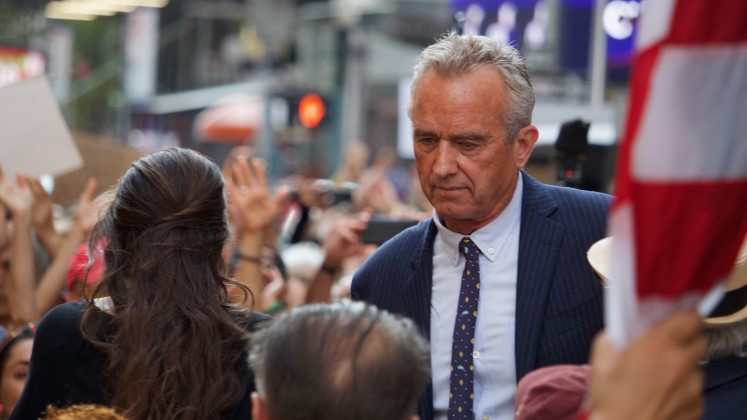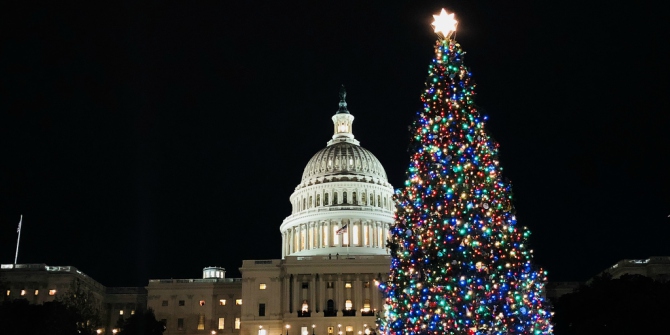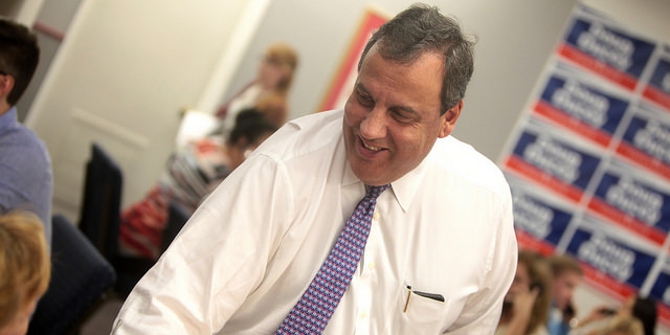This year, LSE USAPP has published hundreds of articles which have been read thousands of times. Here are our top ten most popular original articles by views published in 2016. Thanks to everyone for reading, and we look forward to bringing you the best in commentary and research on US politics and policy in 2017!
1) Trump and the Revolt of the Rust Belt
Much has been made of the inaccuracy of exit polls and voting projections amidst Trump’s shocking win this week. Michael McQuarrie argues, however, that to truly appreciate why Donald Trump was elected the 45th President of the United States we must look beyond distortionary exit polling and come to appreciate the thoroughly regional nature of his victory. Only this can explain Trump’s win, which relied on the Rust Belt’s rejection of Democrat candidate Hillary Clinton – and their resounding endorsement of Trump’s anti-globalist rhetoric. Read more.
2) Why California is so expensive: It’s not just the weather, it’s the regulation
 The state of California has some of the most expensive housing in the country. In new research, Kristoffer (Kip) Jackson investigates why homes in the Golden State have come to cost so much. He finds that it’s down to how land use is regulated; each new land-use regulation reduces a Californian city’s housing supply by 0.2 percent per year. In addition, regulation has a spillover effect, with neighboring cities increasing their own regulations in response to those of others in order to avoid taking on all of a region’s new development. Read more.
The state of California has some of the most expensive housing in the country. In new research, Kristoffer (Kip) Jackson investigates why homes in the Golden State have come to cost so much. He finds that it’s down to how land use is regulated; each new land-use regulation reduces a Californian city’s housing supply by 0.2 percent per year. In addition, regulation has a spillover effect, with neighboring cities increasing their own regulations in response to those of others in order to avoid taking on all of a region’s new development. Read more.
3) Expatriate Americans are the most important voting bloc you’ve never heard of

 Around eight million Americans live overseas, a population which would be the 13th largest state if taken as a whole. In presidential elections overseas turnout is around 12 percent, less than a quarter of the amount in general elections. Jay Sexton and Patrick Andelic argue that despite this low turnout rate, expatriate voters can and have played a decisive role in past elections, such as 2000s recount in Florida. They write that given low turnout rates, both Democrats Abroad and Republicans Overseas have some way to go to ensure overseas voters can play a full role in US elections. Read more.
Around eight million Americans live overseas, a population which would be the 13th largest state if taken as a whole. In presidential elections overseas turnout is around 12 percent, less than a quarter of the amount in general elections. Jay Sexton and Patrick Andelic argue that despite this low turnout rate, expatriate voters can and have played a decisive role in past elections, such as 2000s recount in Florida. They write that given low turnout rates, both Democrats Abroad and Republicans Overseas have some way to go to ensure overseas voters can play a full role in US elections. Read more.
4) Gender is costing Hillary Clinton big among men
 There has been little discussion of the impact of Hillary Clinton’s gender on her electoral prospects, but are American men really ready for a female President? Looking at the results of a new experiment, Dan Cassino finds that the threat to male identity embodied by Clinton is costing her as much as 24 points among men, and bringing her down by 8 points overall. Read more.
There has been little discussion of the impact of Hillary Clinton’s gender on her electoral prospects, but are American men really ready for a female President? Looking at the results of a new experiment, Dan Cassino finds that the threat to male identity embodied by Clinton is costing her as much as 24 points among men, and bringing her down by 8 points overall. Read more.
5) Donald Trump is attracting authoritarian primary voters, and it may help him to gain the nomination.
 With the first primaries of the 2016 presidential election cycle looming, many in the Republican Party are becoming increasingly concerned that billionaire Donald Trump will actually be able to gain the party’s nomination, leading the party to an electoral disaster in November. Using a new national survey of American voters, Matthew C. MacWilliams finds that these fears are well-founded. Trump’s strongman rhetoric has activated and energized American authoritarians to his candidacy providing him with a large and loyal base of supporters in the upcoming Republican contests. An inclination towards authoritarianism is a major predictor of people’s likelihood of voting for Donald Trump in a way that it is not for any of the other GOP candidates. Moreover, Trump voters are ready to suspend constitutionally guaranteed rights such as Habeas Corpus, reject the protection of minority rights, and support the abridgment of religious freedom through the closure of mosques across the US. Read more.
With the first primaries of the 2016 presidential election cycle looming, many in the Republican Party are becoming increasingly concerned that billionaire Donald Trump will actually be able to gain the party’s nomination, leading the party to an electoral disaster in November. Using a new national survey of American voters, Matthew C. MacWilliams finds that these fears are well-founded. Trump’s strongman rhetoric has activated and energized American authoritarians to his candidacy providing him with a large and loyal base of supporters in the upcoming Republican contests. An inclination towards authoritarianism is a major predictor of people’s likelihood of voting for Donald Trump in a way that it is not for any of the other GOP candidates. Moreover, Trump voters are ready to suspend constitutionally guaranteed rights such as Habeas Corpus, reject the protection of minority rights, and support the abridgment of religious freedom through the closure of mosques across the US. Read more.
6) How social media is changing the way people commit crimes and police fight them.
 Until the early years of the 21st century, crimes tended to be committed away from the eyes of the majority of society, with traditional media broadcasting information about them often on their own terms. Ray Surette writes that the advent of social media in the past decade has led to a new type of ‘performance’ crimes, where people create accounts of their law-breaking through text, images and video, which are then digitally distributed to the public on a large scale. He comments that social media has also opened up new ways of combating crime for the police, who can take advantage of the self-surveillance of those who publicize their crimes on social media. Read more.
Until the early years of the 21st century, crimes tended to be committed away from the eyes of the majority of society, with traditional media broadcasting information about them often on their own terms. Ray Surette writes that the advent of social media in the past decade has led to a new type of ‘performance’ crimes, where people create accounts of their law-breaking through text, images and video, which are then digitally distributed to the public on a large scale. He comments that social media has also opened up new ways of combating crime for the police, who can take advantage of the self-surveillance of those who publicize their crimes on social media. Read more.
7) Religion is in decline in the West, and America is no exception

 The US is often taken to be a contrary case to the general decline of religion in the West. David Voas and Mark Chavesfind that religiosity is in fact decreasing in the US, and for the same reason that it has been falling elsewhere. They comment that Americans are not becoming less religious over their lives; rather, the more religious generations born in the early 20th century are dying off and being replaced by newer generations that are less likely to be religious. Read more.
The US is often taken to be a contrary case to the general decline of religion in the West. David Voas and Mark Chavesfind that religiosity is in fact decreasing in the US, and for the same reason that it has been falling elsewhere. They comment that Americans are not becoming less religious over their lives; rather, the more religious generations born in the early 20th century are dying off and being replaced by newer generations that are less likely to be religious. Read more.
8) New analysis of WikiLeaks documents shows that intelligence-gathering at Guantánamo has been ineffective.
 The US has maintained a military prison in Guantánamo Bay, Cuba for more than 14 years, with the stated aim of detaining and interrogating suspected terrorists which have been captured by the US. In new research which uses a dataset of information published by WikiLeaks, Emanuel Deutschmann finds that the prison has been largely ineffective in its intelligence-gathering mission. He writes that the dataset shows that nearly two thirds of inmates revealed no information about their fellow detainees, meaning that calls from politicians to send suspected terrorists to Guantánamo Bay to gain information from them are unrealistic. Read more.
The US has maintained a military prison in Guantánamo Bay, Cuba for more than 14 years, with the stated aim of detaining and interrogating suspected terrorists which have been captured by the US. In new research which uses a dataset of information published by WikiLeaks, Emanuel Deutschmann finds that the prison has been largely ineffective in its intelligence-gathering mission. He writes that the dataset shows that nearly two thirds of inmates revealed no information about their fellow detainees, meaning that calls from politicians to send suspected terrorists to Guantánamo Bay to gain information from them are unrealistic. Read more.
Donald Trump scored a stunning victory over Hillary Clinton on Tuesday. This is an election that political analysts will be debating for some time to come. How did this happen and what does Trump’s victory portend, both domestically and internationally? LSE US Centre Director, Peter Trubowitz, offers some provisional thoughts on these issues. Read more.
10) How Trump’s campaign used the new data-industrial complex to win the election
 This year’s presidential election was not the first ‘social media’ election, but the campaigns did take their use of online data and activism to a whole new level. Jonathan Albright writes on how Donald Trump’s campaign used ‘military grade’ data-driven psychometric micro-targeting to influence people to go out and vote for their candidate. Read more.
This year’s presidential election was not the first ‘social media’ election, but the campaigns did take their use of online data and activism to a whole new level. Jonathan Albright writes on how Donald Trump’s campaign used ‘military grade’ data-driven psychometric micro-targeting to influence people to go out and vote for their candidate. Read more.
Featured image credit: woodleywonderworks (Flickr, CC-BY-2.0)
Shortened url for this article: http://bit.ly/2ixRNS9








